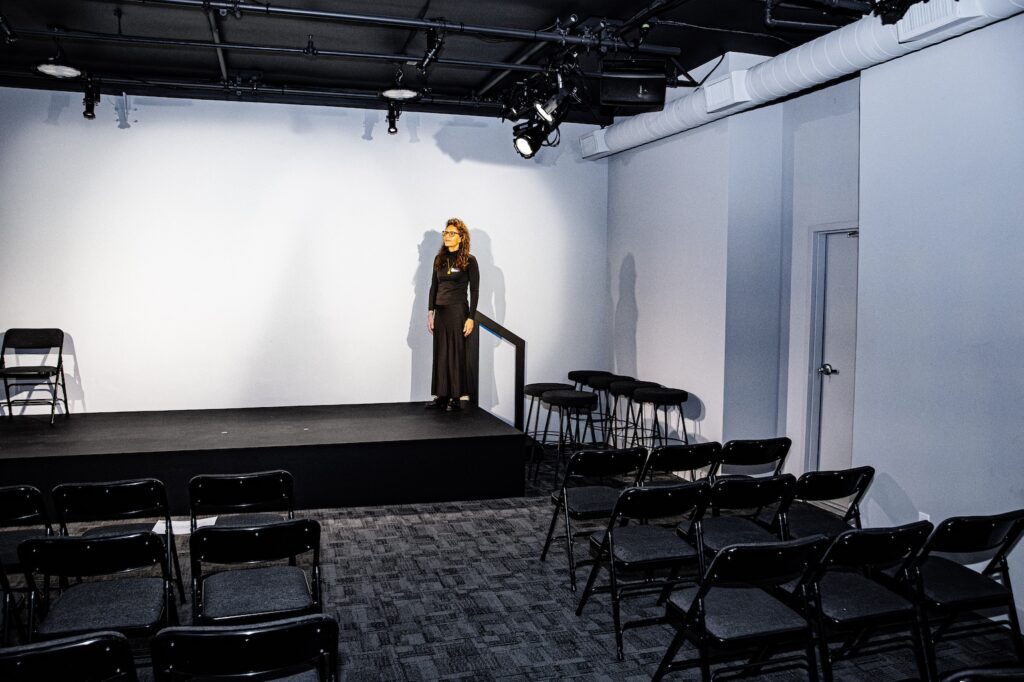Producing Works on Jews Around the World, The Braid Theater Company Celebrates Opening of New Venue
According to its managing director, Sharon Landau, the company has been able to expand its reach into all 50 states and more than 40 countries, ‘and the new space will allow us to livestream and continue to incubate all these shows.’

An Emmy Award-winning writer and comedian, Monica Piper, whose credits include hit series such as “Roseanne” and “Mad About You,” received a phone call in 2008 from an acquaintance and fellow scribe, Ronda Spinak: “Ronda said, ‘Look, I’m starting this amazing thing called Jewish Women’s Theatre, and I would love it if you would consider writing and performing some original pieces.’ And I said to her, ‘Well, Ronda, I’m not that Jewish.’”
Fast-forward a few years: Ms. Spinak’s Los Angeles company was growing, and she asked Ms. Piper, who had become a regular contributor to showcases that each featured several artists, to put together a full-scale play. Titled — wait for it — “Not That Jewish,” the work had its premiere in 2014; initially scheduled for a three-week stint, it ran for 16 months, and then enjoyed an off-Broadway engagement before heading back west for an additional nine months. “Who knew?” Ms. Piper quips.
Now, a new production of “Not That Jewish” is marking the grand opening of a new space at Santa Monica for the theater company, which has since been rebranded The Braid. Its original venue, called Jewish Women’s Theatre’s The Braid, opened in 2015 but closed during the pandemic, though the company has continued building its audience through Zoom presentations.
Before Covid struck, the company also took its performances to different spaces across the country, including New York City’s 92nd Street Y. According to its managing director, Sharon Landau, the company has been able to expand its reach into all 50 states and more than 40 countries, “and the new space will allow us to livestream and continue to incubate all these shows.”

Ms. Spinak, who serves as artistic director, describes those shows as occupying “the intersection of storytelling and theater. The emphasis is on what I like to say is memoir on stage, or documentary theater. There is curation involved and there is editing involved, because it’s not a literary undertaking; it’s theatrical.”
Most of The Braid’s shows take the form of what Ms. Spinak describes as salons, featuring pieces by different writers united by a theme. The lineup for its new season, for instance, includes “Traveler’s Prayer,” described on its website as “true stories of surprise and transformation as we travel away from home but still bring our Jewishness with us”; “Two Faiths, One Love,” featuring “heartbreaking or inspiring stories from interfaith families”; and “For the Love of Animals,” a collection of “Jewish tales about brief encounters or long relationships with animals, domestic or wild, and how they change us.”
In the metropolitan area, The Braid will visit New Jersey next April with “I Loved Jew, I Loved Jew Not,” offering accounts of antisemitism along with stories of Jewish allies; on May 18, it will present “What Do I Do With All This Heritage?” — spotlighting Asian Jews upholding different traditions — at New York’s Museum of Jewish Heritage.
The season will wrap in July with “The World Couldn’t See Me,” commemorating the 35th anniversary of the Americans with Disabilities Act. In addition, The Braid has two new one-person shows in development: one by an actor, writer, and beatboxer, Joshua Silverstein, exploring father-son relationships and identity at the intersection of Black and Jewish communities, and another by a Uruguayan Jewish musician.
Ms. Spinak stresses that such diversity is integral to The Braid’s mission, noting that the company has also produced works focusing on Persian, Iraqi, Latin, and LGBTQ+ Jews, among others. “I mean, Jews come from everywhere in the world. And some of our writers are not Jewish, though most are,” she says.
In December 2023, two months after Hamas’s attack on Israel, Ms. Spinak “did a survey of Jews by choice. I thought, ‘Who are our allies?’ And I found it interesting that many converts were more passionate than ever about defending being Jewish.” The October 7 massacre and other examples of growing antisemitism in recent years, in fact, informed her decision to open the new space with “Not That Jewish.”
“A lot of people haven’t had the opportunity to see it, and in these times of uncertainty and division, this is a show that people can come together to see and laugh and cry together,” Ms. Spinak says. “It asks, ‘How do you pass your values down to the next generation, and what values do you want to share?’ And, ‘How do you think about identity, and what’s important?’”
Ms. Piper tweaked the play after the October 7 attacks, she says, “not to the point where we’re hammering people over the head, but there are references. I don’t want to give too much away, but there’s a point where I’m trying to explain to my son how important it is that we pass things down — that one Jew creates another Jew. But I don’t just talk about being Jewish; anyone who’s ever lost a parent, or been a mother, or been divorced, or had cancer, or adopted a child — or given a child up for adoption — will relate to this show.”
Ms. Piper also emphasizes that “Not That Jewish” is “a comedy above all. One of the themes is that Jews are funny, even when we’re facing the dark stuff. That’s repeated in the play a couple of times. And we keep on going.”

